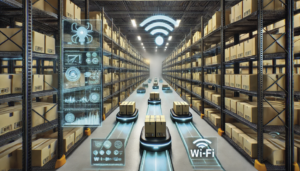Wholesale trade trends after 2024: tech, AI, sustainability…
Wholesale is undergoing a huge transformation, driven by changing consumer demands, technological advances and strengthening competition.
This article is available for reading in Trade magazin 2024/10
E-commerce continues to grow
Wholesale has been hit particularly hard by the disruption caused by the Covid pandemic, the effects of which can still be felt today. A NuOrder report from 2024 report, which involved 65 leading brands and several well-known retail experts, looked at wholesale trends over the next five years. This has found changes in consumer behaviour were evident during and after the Covid period: e-commerce increasingly became the new norm due to security concerns and this trend has continued ever since. The entire wholesale distribution industry has had to find new ways to stay competitive. Currently the global e-commerce market is worth USD 6.3tn.

Businesses must diversify their supply-chain networks
Intensifying competition
The retail sector – especially the food industry – is experiencing increasingly intense market dynamics, with competition between large players and smaller retailers intensifying. There is a growing emphasis on the role of industry regulation and supervision to make sure that the dominant players don’t use their size to unfairly limit the opportunities of smaller businesses. Plus by 2025 analogue systems based on PSTN (Public Switched Telephone Network) will be replaced by digital solutions in many business functions, including telecommunication, payments and security systems.
Growing demand for tech improvements
Businesses that have already implemented cloud-based ERP systems are likely to already be using some AI tools in their digital inventory and warehouse management. According to the 5th edition of Deloitte’s “State of AI in the Enterprise”, 94% of global business leaders believe that AI will be essential to remain competitive over the next 5 years. Automation is revolutionising wholesale distribution, increasing operational efficiency and accelerating growth. In an automation context, AI isn’t only being integrated into cloud-based systems, but its application areas could include the Internet of Things (IoT), blockchain technology, and real-time data analytics.
Personalised customer experience and sustainability
The needs of today’s B2B customers are very different from those of previous years, and wholesalers need to take this into consideration. Customers expect fast and seamless processes, with shorter delivery times and more delivery options. A personalised customer experience is a great competitive advantage: this includes customised pricing, product choice, simplified ordering processes and convenient delivery options. Although 62% of US companies surveyed by B2BMarketing feel they need to improve their retail structure to deliver a personalised experience, 49% don’t have a documented strategy to do so yet. Wholesalers also need to recognise that sustainability goals such as energy efficiency, packaging waste reduction and certification can be a competitive advantage.

B2B necessitates personalized customer experience
Omnichannel solutions
Companies need to diversify their supply chain networks, digitalise their operations and become strong enough to enter the global market – borders matter less and less. Standardised platforms enable wholesalers to sell via traditional channels, personally and by phone, as well as newer digital channels such as e-commerce websites and mobile apps. Omnichannel platforms also help integrate different sales channels, showing inventory and orders at the same place and optimise fulfilment across channels. //
The D2C model is spreading
Direct-to-consumer (D2C) sales are expected to grow by 24.3% per year worldwide between 2021 and 2026, driven by growing consumer demand for direct brand experiences as personalised shopping experiences become a priority, according to Statista’s 2024 survey. At the same time the wholesale model remains resilient: 45% of companies continue to choose to expand with wholesale partners, owing to high customer acquisition costs and macro-economic pressures. The biggest advantage of wholesale is the volume and scale advantage: with higher order volumes, companies can optimise their production, which is particularly useful in the case of products that require a large physical presence and in-store availability. //
Related news
Forced paths: trends and decisions in 2026
🎧 Hallgasd a cikket: Lejátszás Szünet Folytatás Leállítás Nyelv: Auto…
Read more >








